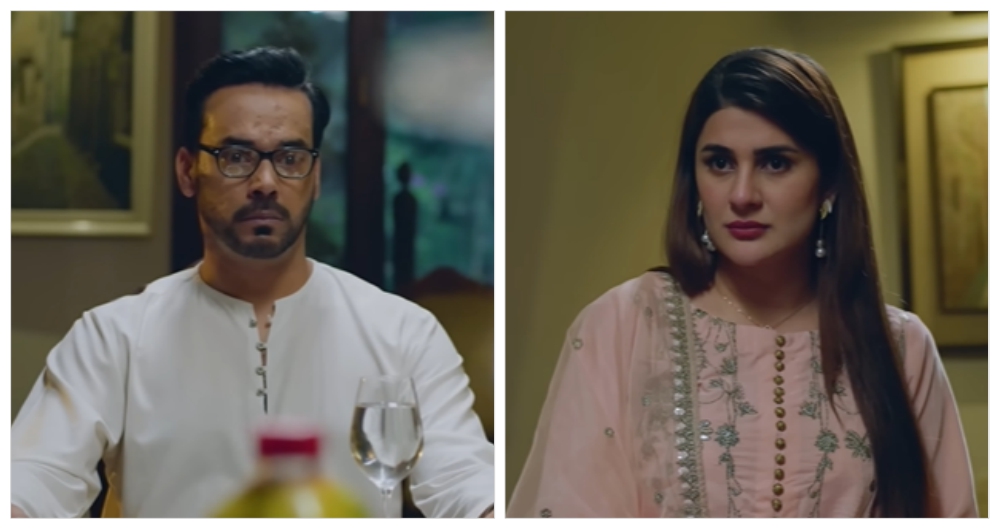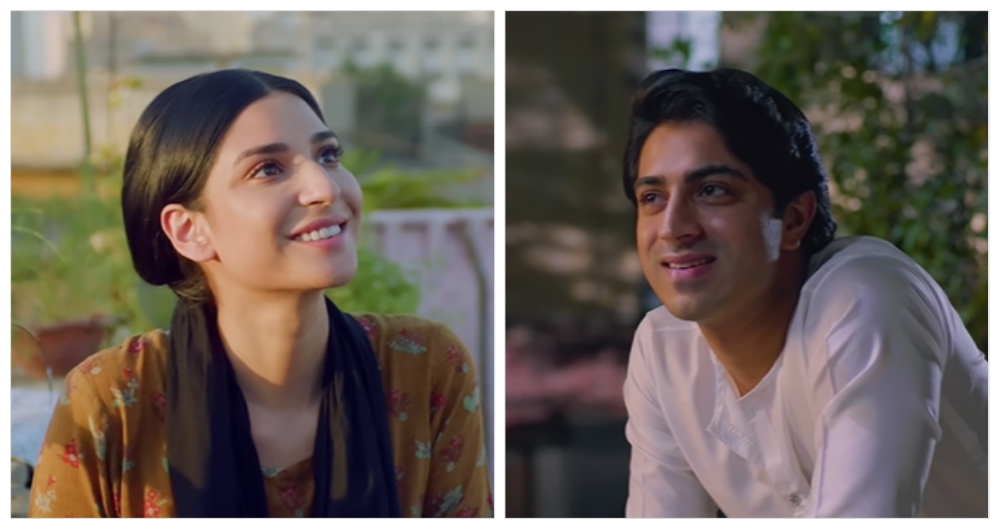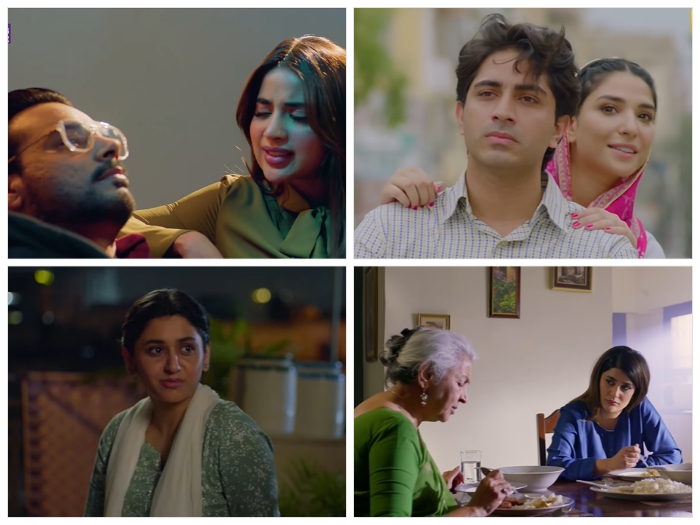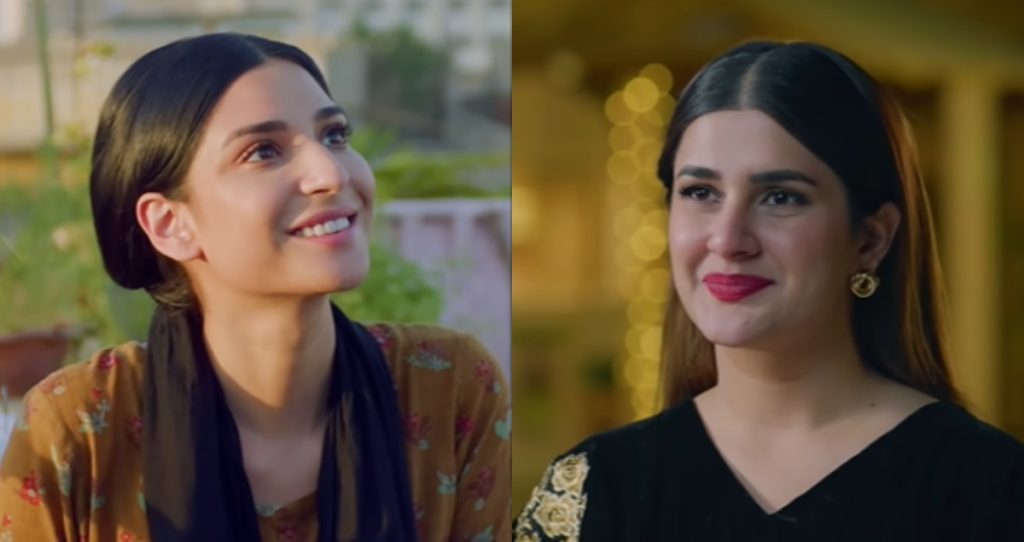Writer: Umera Ahmed
Director: Haseeb Hassan
Producer: 7th Sky Entertainment
After tuning into Jannat Se Aagay initially when it went on air and not warming up to it, I decided to revisit this drama now that it has been on air for 12 weeks. I must say that Jannat Se Aagay has pleasantly surprised me with its intriguing and unexpected plot developments. As the story progressed, the true purpose and meaning of the drama has been unveiled. The unexpected twists and turns have not only piqued my interest but also added depth and complexity to the storyline.
Core Concept & Themes
The core concept of the drama serial “Jannat Se Aagay” and some of its characters did come across as familiar in the beginning but the unique dynamics these characters share are brand new. The drama so far explores themes such as love, betrayal, ambition, and unmet desires. The writer has handled all these themes intelligently and realistically. It is interesting how the writer has shown “ambition” as both a driving force and a potential source of conflict. Materialism lies at the heart of the narrative; it is a fundamental driving force that significantly shapes the course of both Jannat and Tabbasum’s lives.
The concept of “jannat” in the story is a symbol of an ideal or an unattainable state of being. Tabbasum and Jannat have been presented as personifications of humanity’s relentless quest for perfection. Both these characters have an entirely different approach to achieving this elusive goal. Tabbasum takes Farooq’s unconditional love for granted because she is preoccupied with external markers of success and happiness, such as wealth, possessions, and social status. Tabbasum’s relentless pursuit of materialistic gains is gradually intensifying blurring the line between right and wrong. Through these changes in Tabbasum’s priorities and attitude, the writer has shown what happens when the pursuit of material gains clashes with ethical considerations.
On the other hand, Jannat yearns for the kind of emotional connection and love that Tabbasum overlooks. Jannat recognizes the significance of Farooq’s unconditional love because she is deprived of it. This contrast highlights the themes of the story, such as the true sources of happiness and fulfillment. By showing these dynamics the writer has raised questions about the nature of success and the trade-offs individuals make in their pursuit of happiness.
Another important element of the story revolves around the notion that appearances can be deceptive, both in terms of objects and individuals. This theme shows the stark contrast between Jannat’s public image and her private life, as well as through Tabbasum’s track, which centers on the misconception that material wealth can guarantee happiness. On the surface, Jannat may appear to be the embodiment of success and happiness, with her glamorous public image, wealth, and fame. However, beneath this carefully crafted facade, lies a more complex and vulnerable individual struggling with personal demons.
Tabbasum & Jannat’s Inner Conflicts
The conflicting elements in both these main characters make them more appealing and wholesome. The viewers do not know much about Jannat’s backstory so far except for the fact that she worked hard to attain this financial status. Despite Jannat’s deep-seated yearning for authentic human connections and her discontentment regarding the emotional toll of her current lifestyle, being a status symbol is important to her. It is as if she is trapped in a web of societal expectations and the pressure to maintain a certain image. So far, this aspect of her personality continues to shape her choices and actions, even when they conflict with her innermost desires. This internal conflict has to be the most compelling element of her character development. This character and its journey is a nuanced portrayal of someone torn between the pursuit of societal validation and the pursuit of heartfelt connections.
In the beginning, Tabbasum’s unwavering commitment to safeguarding Jannat ji’s well-being and her protective instinct towards her ‘ideal’ seemed authentic without a doubt. However interestingly enough, beneath this apparent dedication is another side of her personality, one that quietly whispers that she is also entitled to the rewards that Jannat possesses. This internal conflict within Tabbasum makes this character more enigmatic and difficult to predict. This element of her personality sets her apart from the stereotypical depiction of other materialistic leading female character often shown in Pakistani dramas. Also, this duality in her characters leads to moments of tension and ambiguity in the storyline, making her character more relatable. Viewers are often left wondering which aspect of Tabbasum will prevail in any given situation, adding depth and intrigue to her portrayal.
Jannat & Nauman
It would be safe to say that Jannat and Tabbasum take center stage in the narrative. However, both the male leads play an important role in shaping their tracks. Nauman feels that his wife has placed her work and social status above their relationship, leaving him feeling belittled and neglected. After continued failed attempts to share his feelings with his wife, Nauman uses this as an excuse for having an affair. He is an unsupportive husband who harbors jealousy and resentment towards his wife’s rising fame and success. Jannat has definitely contributed to this but she has done so unconsciously. Knowing how their relationship evolved and what their priorities were in the past would provide much-needed context. This context could reveal whether their relationship was different before fame and money came into play.

One notable aspect of Nauman’s character is his seemingly contradictory behavior. On one hand, he resents Jannat’s fame and the attention she receives, but on the other hand, he has no problem enjoying the luxuries and comforts that her success brings. There is a clear lack of communication between Jannat and Nauman. Nauman blames Jannat for this as well. Jannat is willing to work on this marriage but the lack of healthy communication between them makes it impossible to have a decent conversation with her husband. Also, the fact is that Jannat is too caught up in her own world and has actually made Nauman feel unneeded multiple times, subconsciously. This creates a frustrating loop, where her attempts to bridge the gap are met with resistance or frustration from Nauman, further worsening the problem. Nauman’s infidelity has made matters worse and it seems as if this relationship cannot be rescued.
The uneven distribution of domestic responsibilities has also been obvious throughout these episodes. It not only places a considerable strain on Jannat, who constantly juggles the demands of her career with those of managing their home, but it also raises questions about Nauman’s commitment to sharing the responsibilities.
Tabbasum & Farooq
Farooq’s character bears a striking resemblance to Faraz from “Wabaal” in terms of his unwavering love for Tabbasum and his naivety. His affection for Tabbasum knows no bounds, and it serves as the cornerstone of his existence. Just like Faraz from Wabaal, Farooq demonstrates a remarkable capacity to overlook and dismiss all the warning signs and potential pitfalls. His sole objective is to maintain a harmonious and amicable connection with Tabbasum, even if it means turning a blind eye to many of the conflicting interests. Farooq’s strategy will ultimately lead to more significant challenges down the road.

It is obvious that Tabbasum holds a dominant position in this relationship. She also takes Farooq’s unwavering love and commitment for granted. She has grown so used to the sheltered and unreserved affection he provides that she does not fully grasp the value it holds. This lack of awareness coupled with her changing ideals has led to certain complacency, where Tabbasum unconsciously feels that Farooq’s love will forever be there, regardless of her actions. Just like Anum and Faraz from Wabaal, Tabbasum and Farooq’s distinct viewpoints towards life not only shape their relationship at the moment but also introduce a conflicting situation. Tabbasum’s outlook is pragmatic, focusing on practicality and material needs. In contrast, Farooq’s perspective is idealistic, emphasizing the importance of emotional connection above everything else. I am really interested in finding out how this track will unfold in the future.
The Performances
Kubra Khan’s performance as a character who outwardly appears to have all aspects of her life perfectly in order, yet privately grapples with a multitude of personal struggles, has been convincing. Her portrayal draws viewers into the character’s world, inviting empathy for the hidden battles. She has done especially well while translating Jannat’s soft and sensitive side on screen. Kubra Khan’s Urdu accent lacks clarity at times but other than that her performance has been on point. Ramsha Khan’s outstanding performance is unquestionably one of the standout highlights of this drama. What truly sets her performance apart is the captivating air of mystery she weaves into her character. This keeps the viewers wondering about Tabbasum’s actual intentions and her next move. Ramsha has also done exceptionally well portraying Tabbasum’s changed priorities on screen.

Talha Chahour is one of the most promising new talents in the Pakistani television industry, displaying remarkable potential. However, it is disappointing that he appears to be at risk of falling into a typecasting trap. While his performance in this drama is commendable overall, his role and his performance in this drama closely resemble his previous character in Wabaal. There is a sense of familiarity in his character, which, although skillfully executed, leaves me wanting to see him in more diverse and challenging roles that truly showcase his range as an actor.
Saboor Aly and Gohar Rasheed’s performances are decent enough but they do not bring much to the table. Given Gohar Rasheed’s talent and experience, I expect a bit more in terms of emotional resonance. In the ensemble cast of supporting actors, Dania Enwer’s performance truly shines, standing out with its remarkable and organic appeal.
The Strengths
Jannat se Aagay’s well-crafted script is its strongest asset. Ramsha Khan’s stellar performance also adds to its engagement value. The script keeps viewers on the edge of their seats with its unpredictability and offers a refreshing break from clichéd storylines. Also, the character arcs are thoughtfully developed, adding depth and intrigue to the narrative.
Jannat Se Aagay reminds me of Umera Ahmed’s most masterfully written and unforgettable dramas which I have re-watched repeatedly. What stands out so far is Umera Ahmed’s signature style of storytelling, characterized by its seemingly straightforward surface narrative that conceals a deep and impactful core.
The Shortcomings
While the storytelling is engaging, the overall treatment given to the story occasionally hinders its pace. Some scenes tend to linger longer than necessary, which can test the viewers’ patience. Moreover, the background score does not consistently live up to expectations. There are instances where it fails to enhance the emotional impact of important scenes, missing opportunities to elevate the viewing experience.
One aspect that has proven to be particularly distracting is the way food consumption scenes are filmed in the drama. These scenes are a frequent occurrence in each episode, but what stands out is the obvious effort made by the actors to avoid actually eating the food, and this tends to detract from the overall viewing experience. While it is completely understandable that actors want to abstain from consuming unhealthy food, it raises the question of whether there could be alternative methods employed by the writer and director to depict these characters in more natural dining settings. This could be achieved by creative camera angles, close-ups of food, or skillful editing that maintains the illusion of food enjoyment without actual consumption.
Final Remarks
Jannat Se Aagay covers a broader and more profound narrative than just delving into the world of morning shows, the women who host them, and the competition for higher ratings. While these elements are certainly part of the storyline, the drama digs deeper into complex themes and human relationships. The drama also ventures into the exploration of love, ambition, and the quest for contentment. Most of the characters in the drama are in search of their ‘jannat’ which makes for an interesting watch.
Are you watching Jannat Se Aagay? Do share your views about it.
